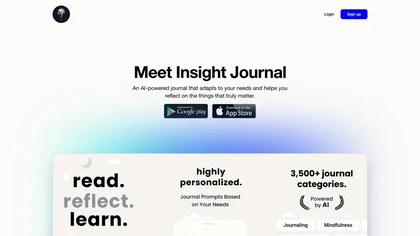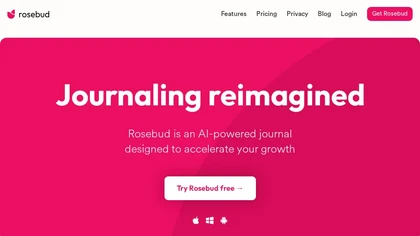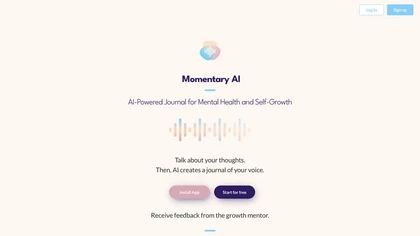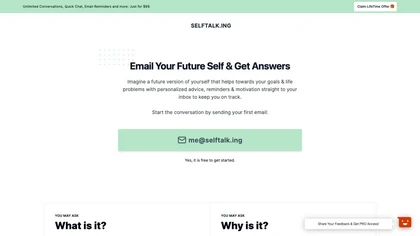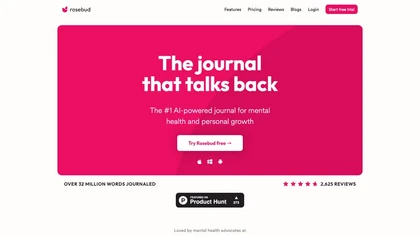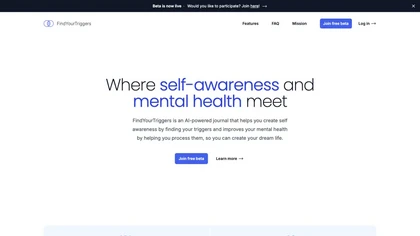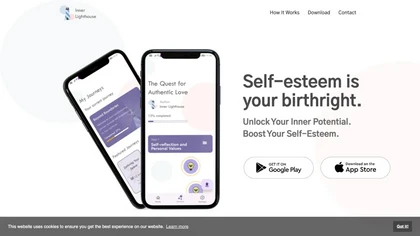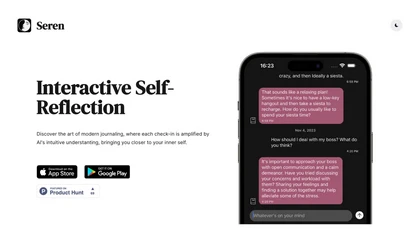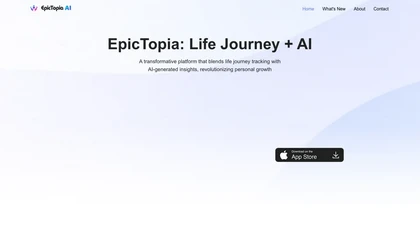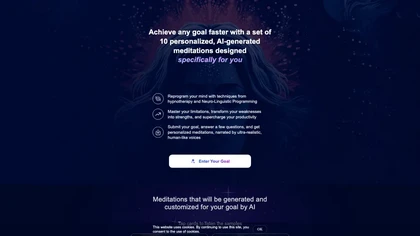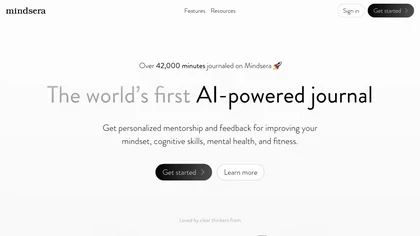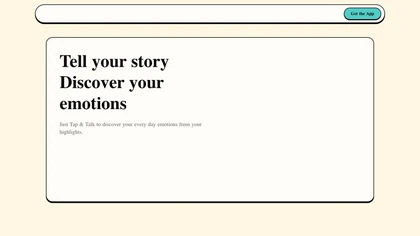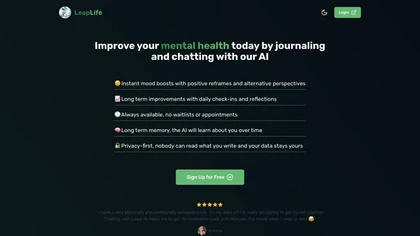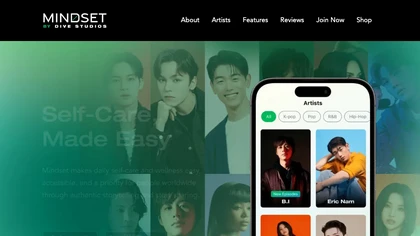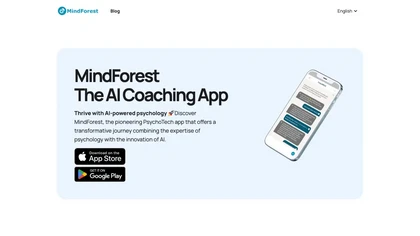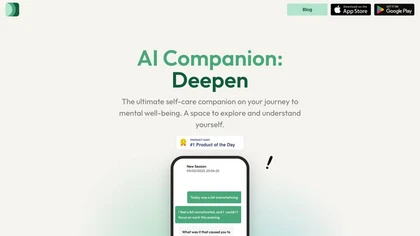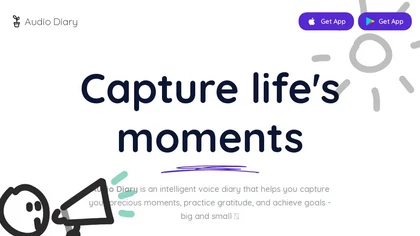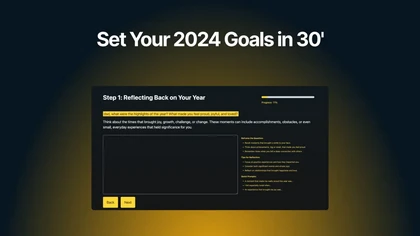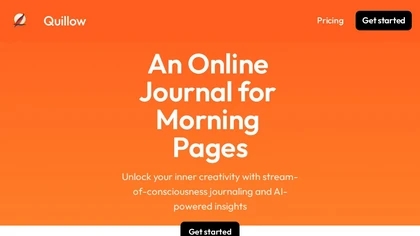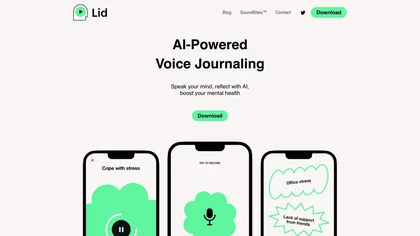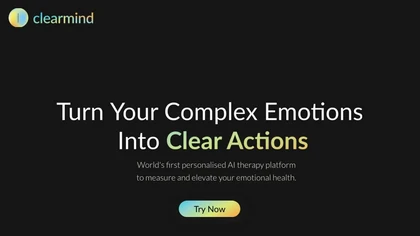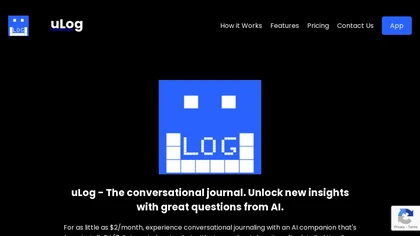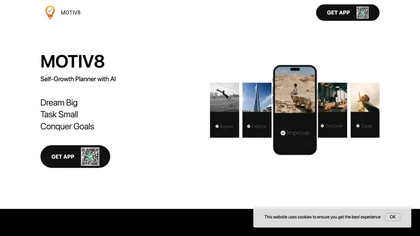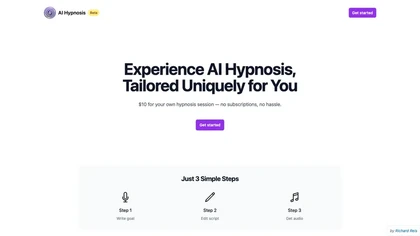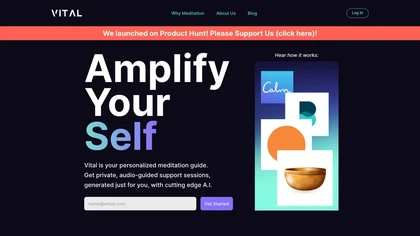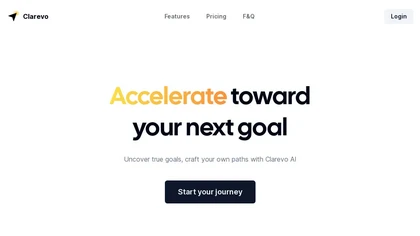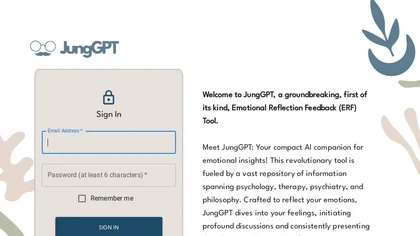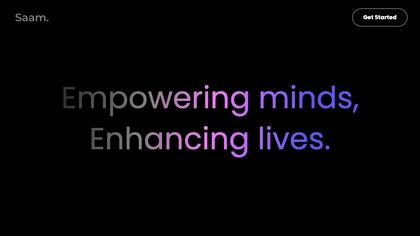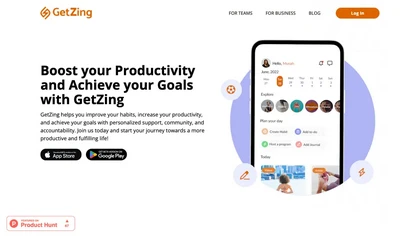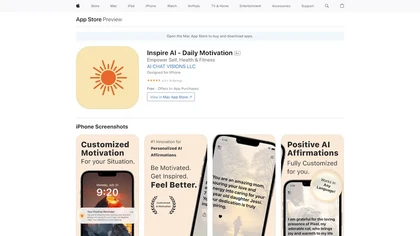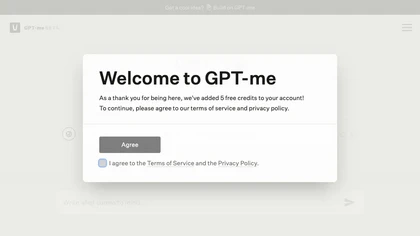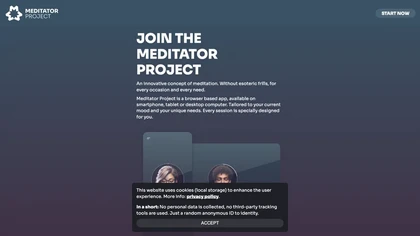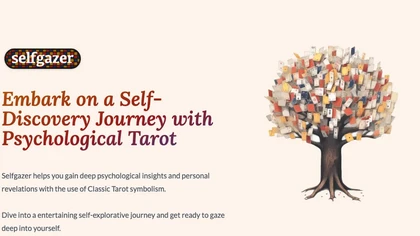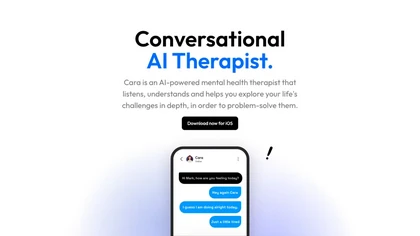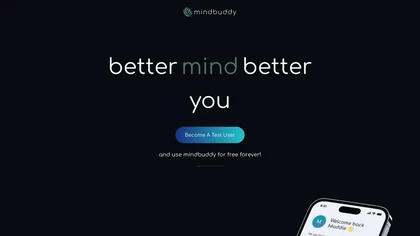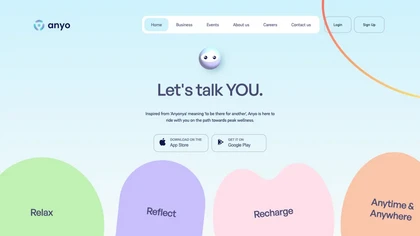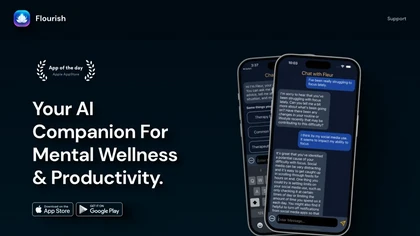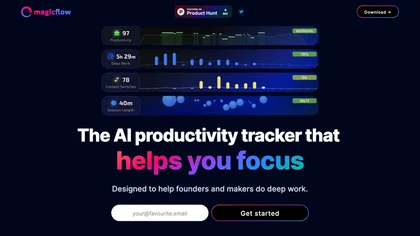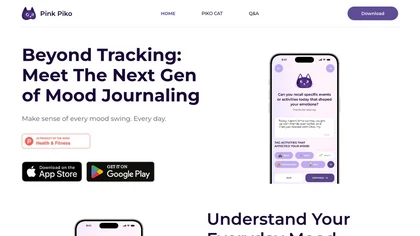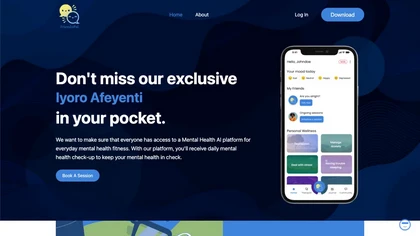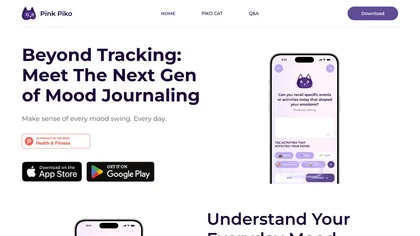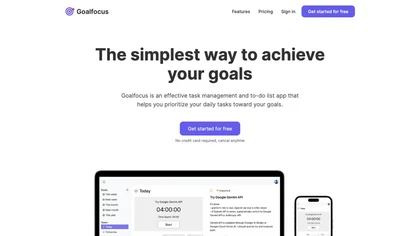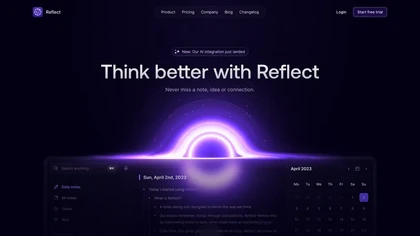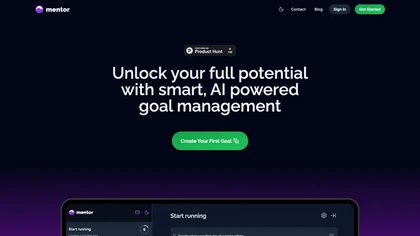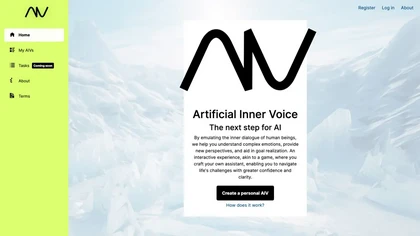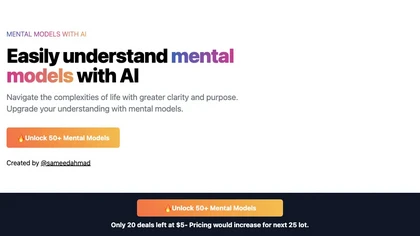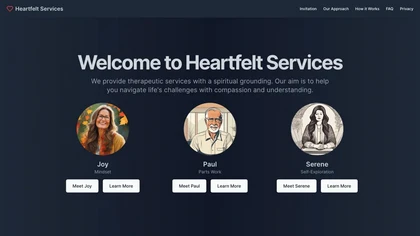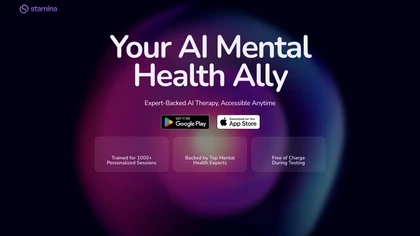AI use cases for Self-reflection
Generative AI can be applied in various applications for self-reflection. Here are some examples to explore below for inspiration with AI tools to get you started with using AI in self-reflection.
🛠️ 70 AI tools for Self-reflection
Explore a dynamic list of some of the most popular tools to get you started with various AI use cases and applications for Self-reflection to streamline your workflows and productivity today.
MoodPen features
- Real-time reflection
- Personal growth tracking
- Automated journal reflections
- Personalized feedback and suggested actionable steps
- Multi-lingual support
Insight Journal features
- AI-powered
- Intuitive interface
- Organize thoughts
- Track progress
- Privacy and security
6000 thoughts features
- Organize thoughts
- Clarify thinking
- Identify biases
- Achieve breakthroughs
- Self-reflection
Rosebud Journal features
- Analyzing thoughts
- Organizing into themes and topics
- Extracting insights
- Uncovering patterns
- Auto-tagging entries
Momentary features
- AI-powered journaling experience
- Voice-activated journaling
- AI-powered transcribing
- Mood categorization
- Supportive AI mentor
Selftalk.ing
4.9Selftalk.ing features
- Unlimited conversations with future self
- Quick chat interface
- Email reminders
- Personalized advice and motivation
- Access to past conversations
Rosebud features
- Daily check-ins
- Auto-tagging key insights
- Identify meaningful goals
- Track people, topics, and moods
- Emotionally-focused capabilities
🔥
Create your account, save tools & get personal recommendations
Receive a weekly digest of our handpicked top tools.
Unsubscribe anytime
FindYourTriggers features
- AI-powered journal
- Generates prompts based on user input
- Tracks user moods
- Identifies and processes behavior triggers
- Supports a structured three-step plan of assessment, planning, and implementing
Inner Lighthouse features
- Structured approach towards self-esteem improvement
- Variety of expertly curated journeys
- Daily 10-minute cognitive exercise sessions led by professional psychologists
- Privacy and security measures
- Integration into daily routine for well-being enhancement
Seren features
- AI-powered interactive self-reflection journaling tool
- AI chat functionalities for insightful feedback and guidance
- Delve deeper into emotions and thoughts
- Secure and private space for self-discovery
- Encrypted conversations and focus on privacy
EpicTopia AI features
- Life journey tracking
- AI-generated insights
- Tailored action plans
- Personalized chronicle on a timeline
- Detailed guidance
Neomind features
- Personalized meditations generated by AI
- Utilizes hypnotherapy and neuro-linguistic programming techniques
- Customization based on user's specific goal and needs
- Narrated by ultra-realistic, human-like voices
- Accompanied by a 53-page workbook with science-backed exercises and NLP techniques
Mindsera features
- Mentor model
- Mindset analysis
- Automatic summaries
- Habit tracking
- Dark mode
Journalie features
- Transcription of entries
- Automatic organization in a calendar format
- Social sharing features
- AI-generated unique pages
- Enhanced journaling experience
Pagefelt features
- Web app
- Journal daily
- Instant custom feedback
- Ai-generated bookmarks
- Improve mental health
AtFirst features
- Affirmations
- Relaxation sessions
- Self-help guides
- Community feature
- Guided sleep affirmations
Mynd features
- Key themes
- Emotions
- Patterns
LeapLife features
- AI chat function
- Personalized chatting AI
- Daily journaling
- AI therapists chat
- End-to-end encryption
HeartDialog features
- 24/7 availability
- Personalized conversations
- Privacy protection
- Context tracking
- Integration of journaling, meditation, and CBT
Mood AI by Mindset features
- Daily check-ins
- Daily reflections
- Expert advice
- Daily quotes
Plan Quest features
- Visual timeline
- Objectives and key results (OKRs)
- Notion-like editor
- Reflection canvas
- Timeline visualization
MindForest features
- AI-powered psychology for personal growth
- Insight Journal feature for automatic journaling
- Tailored insights and exercises based on psychological principles
- Psychometrics assessments for understanding personality facets
- Integration of psychology expertise with AI innovation
GetZingAI features
- Personalized habit management tool
- Curated challenges and programs
- Reflection feature for journaling
- Integration with productivity tools
- Community and accountability features
Deepen features
- Chat sessions with AI companion
- Guided conversations
- Insights dashboard
- Supports exploration and understanding of emotions
- Aids in decision-making
Solid Apps features
- Voting Board functionality
- Feature suggestion
- Sorting by Trend, Top, and Newest
- Filtering by Category and Status
- Integration with Apple Health
Audio Diary features
- Task 1
- Task 2
- Task 3
- Task 4
- Task 5
MyYearInReview features
- Assist in reflecting on the past year
- Help set goals for 2024
- Provide a guided framework for goal setting
- Maintain complete data privacy
- Transform vague ideas into actionable goals efficiently
Quillow features
- built-in flow timer
- strikethrough function
- AI-powered insights
- subconscious mind tapping
- safety and privacy of user data
Lid features
- Voice note journaling
- AI-powered analysis of voice entries
- Password protection for journal entries
- Face ID access security feature
- Creation of personalized soundbites
Space of mind features
- Affordable PTSD support
- Facilitated peer support
- Anonymous therapist help
- Licensed therapist-guided sessions
- Range of support spaces
Lebenmaster features
- 3-step process for goal forecasting
- Daily progress logs
- Task management functionality
- Brainstats feature
- Support for executing tasks faster and efficiently
Clearmind features
- To-Do lists
- Mood cards
- Meditation scripts
- Chat
Ulog features
- Create detailed timelines
- Intelligent ai companion
- Set reminders
- Track various topics
- Customizable reminders
IX Coach features
- Goal setting
- Obstacle overcoming
- Action planning
- Social interaction understanding
- Communication improvement
Dreamt features
- Dream recording
- Voice or text input
- Dream statistics
- Automated sentiment analysis
- Tagging
MyCody features
- Streamline career journaling process
- Centralize career management
- Track achievements, goals, and learning experiences
- Provide insightful analysis summaries of career logs
- Offer personalized goal-setting and organization through customizable tags
Motiv8 features
- Goal breakdown into detailed task lists
- Browse trending ideas and ready-to-use task lists
- Seamless task management
- Personalized guidance and recommendations
- Data security and privacy measures
Insightful features
- Provide personalized on-demand coaching
- Focus on specific needs
- Available anytime, anywhere
- Blog with latest insights on living a fulfilling life
- Accountability coaching to help young professionals reach full potential
AI Hypnosis App features
- Customized hypnosis sessions tailored to individual goals
- Ability to input goals and edit scripts for personalized audio files
- Utilizes OpenAI Elevenlabs for audio generation
- Secure transactions through leading financial service Stripe
- No subscriptions, just a one-time payment for tailored sessions
Vital features
- Personalized audio-guided sessions
- Selection of eight specific meditation techniques
- Six different AI meditation coaches
- Automated email guidance
- Community building through practice comparisons and point system
JungGPT features
- Emotional reflection
- Emotional support
- Personal growth
- Self-reflection
- Therapeutic exploration
Txt Your Ex features
- Replace negative words with positive ones
- Encourages healthier communication
- Provides a secure space for sharing
- Designed for personal growth
- Supports mindful communication practices
Drsaam features
- Journaling
- Friend integration
- Confidentiality
- Privacy
- Security
Stepseed V2 features
- Automatically divides goals into attainable milestones using AI analytics
- Provides personalized advice and motivation from Seedy, the AI life goal coach
- Allows users to create action plans
- Enables users to add unlimited journal entries
- Access to curated video content to help users stay on track
Dr. FeelGood features
- Personal AI motivational coach
- Human-like understanding
- Powerful motivational capabilities
- Available 24/7
- Coaching sessions anytime needed
GetZing features
- Personalized support
- Curated challenges and programs tailored to individual needs and interests
- Habit management
- AI-powered scheduling recommendations
- Data security focus
InspireAI features
- Personalized affirmations
- Motivations for health, fitness, and mindset
- Endless supply of positive mindset quotes
- Smart suggestions
GPT-Me features
- Converse
- Restart
- Inner voice
- Crowded places
- Solitude
Meditator.pro features
- Browser-based app
- Available on smartphones, tablets, and desktops
- AI-guided meditation tool
- Choose between two AI coaches
- Specially designed meditation sessions
DayBright: Daily Inspiration features
- Delivers daily wisdom nuggets across various topics
- Allows sharing and saving advice easily
- Provides scientifically backed content
- Offers interactive widgets for quick access to inspirations
- Auto-refresh feature and customizable notification settings
Selfgazer features
- Tarot reading
- Self-discovery
- Entertainment
- Personal revelations
- Psychological insights
Cara features
- Conversational AI therapist
- Powered by GPT
- Natural responses and advice
- Insightful and non-judgmental guidance
- Available on iOS
mindbuddy app features
- Specially trained chatbot 'buddy'
- Specialization in cognitive behavioral therapy (CBT)
- Personalized guidance through AI
- Track mood and access past chat sessions
- Continuous learning and adaptation capabilities
Anyo features
- Personalized self-care activities
- Resilience building through Carebox
- Real-time connections with listeners
- Seamless booking of therapist appointments
- High-quality content in yoga, psychology, meditation
Flourish features
- Meaningful Conversations
- Psychology-based Mental Health Assessments
- Stress Relief Tools
- Productivity Tools
- Quality Mental Health Support
Magicflow.com features
- Live flow timers
- Focus sessions
- Pomodoro timers
- Distraction warnings
- Glowing flow meter
PinkPiko features
- Mood tracking
- Interactive experience
- Insightful questions
- Personalized emotional insights
- Actionable insights
FriendnPal features
- virtual one-on-one chats with therapists
- supports various African languages
- booking therapy sessions online
- ASMR sounds for relaxation and stress relief
- digital journal for mood tracking
Ponder features
- Tailoring guided meditations to emotional needs
- Personalizing meditations based on current emotions and situation
- Offering flexible meditation options
- Providing structured courses for meditation
- Adapting to support the user's self-discovery and growth journey
Lotus features
- AI therapist functionality
- Cognitive behavior therapy (CBT)
- Virtual therapist interaction
Pink Piko features
- Interactive tracking experience
- Insightful questions for emotional reflection
- AI-powered technology for interpreting mood logs
- Personalized emotional insights
- Transforms emotional data into tangible insights
GoalFocus features
- Create SMART Goals
- Break goals into subgoals, tasks, and subtasks
- Prioritize tasks with Eisenhower Matrix
- Increase focus on each task
- Overcome procrastination with timeboxing
Reflect AI features
- Transcribe voice notes with human-level accuracy
- Generate article outlines
- List key takeaways from meetings
- Fix grammar and spelling errors
- Organize thoughts through backlinked notes
Mentor v1 features
- Goal breakdown into manageable tasks
- Step-by-step guidance for goal achievement
- Progress tracking on a dashboard
- Email notifications for upcoming tasks
- Personalized notes and guidance customization
Artificial Inner Voice features
- Emulates inner dialogue of human beings
- Helps users understand complex emotions
- Provides new perspectives
- Functions like a game
- Serves as a personal assistant
Mental Models features
- Mental model generation
- Encourages different thinking
- Biases confirmation
- Cognitive dissonance reduction
Heartfelt Services features
- Virtual therapists (e.g., Paul and Serene)
- Innovative approach to self-exploration and healing
- Confidentiality prioritization
- Non-judgmental space for users
- Team of dedicated therapists
BodyGuru features
- Personalized wellness routines generation
- Tailored recommendations
- Free platform
- Upcoming features integration
- Developed by JBBAE
Stamina AI features
- Expert-backed AI therapy tool
- Over 1000 personalized sessions
- Cognitive behavioral therapy techniques
- 24/7 availability
- Personalized support from a team of 200+ mental health professionals

